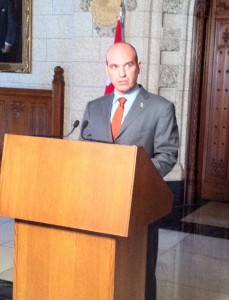Green Party leader Elizabeth May held a press conference this morning to talk about cuts and austerity, and as part of that suggested that the government could save $100 million by forgoing the construction of the “crystal palace” to replace the House of Commons. This of course refers to the plan to glass in the courtyard of the West Block, which will serve as a temporary House of Commons while the Centre Block undergoes needed renovations. May’s suggestion is that the Commons relocate down the street to the Government Conference Centre – the old train station across from the Chateau Laurier.
When the so-called “crystal palace” was first unveiled, there were a number of people writing into newspapers suggesting that the House could perhaps “tour” various parts of the country, and incredulously suggested that the only people put out would be those MPs who hail from different time zones, and that those from closer ones would get the break for the change.
What either of these proposals miss are the fact that the House of Commons is more than just a chamber in isolation. There is a machinery of government that cannot simply pick up and move. That the Chamber itself will be moving one building over to the West Block will be disruptive enough to the machinery of government, but the logistical hurdles necessary to accommodate either move would be unfeasible to say the least.
First of all, the Commons is more than just a debating society in isolation that can debate wherever it likes. While in theory, MPs could hold debates wherever they like, the fact is that they have committee duties, staff, and obligations within their offices that cannot simply be packed up and done out of hotel rooms for weeks or months at a time. More than that, ministerial offices are located in Ottawa, and having ministers work entirely remotely from there is a non-starter. The “democrabus” of a travelling Chamber is an idea that holds no basis in reality.
As for May’s suggestion, however, she seems to miss some of the finer logistical points. For starters, it’s more than just the fact that the Chamber itself is a rather technologically sophisticated marvel, between wiring for sound and simultaneous translation, as well as for television. As well, there needs to be adequate security measures in place, and room for press, dignitaries to visit, and the general public to observe. None of this can be accommodated either in the Government Conference Centre, a ballroom at the Chateau Laurier, or any other nearby space that would be physically large enough. On top of that, the distance between the Conference Centre and the rest of the offices in the precinct become unwieldy. It’s bad enough with the committee rooms at One Rideau under the Chateau Laurier – and those are only committee rooms. When it comes to debates or votes, getting MPs and staff to and from the Conference Centre becomes a nightmare, and even doubling the fleet of little green busses becomes not only an expensive proposition, but one would add a step back for the environmental credentials that May possesses. Simply demanding that 338 MPs (as they would be at the time) and staff trudge quickly through blocks of wind and snow in December or January is not going to be feasible.
While people may grumble about the expense of putting in the glass dome in the West Block as part of its restoration process (as the building had reached the point of systems failure), it’s important to realise that not only will it have to accommodate the technological aspects of the Chamber, but the logistical demands as well. Only that space is so well situated and suited. And for as temporary as it will be – and we all know it will be for longer than currently advertised, as the renovations and restorations inevitably come in over time and over budget – it’s not as though it’ll simply be abandoned once the Commons moves back into a renovated Centre Block. The new glassed-in space will be used for committee rooms in the West Block for generations that will follow. I’m sure that over its lifetime the money will end up being well spent.

